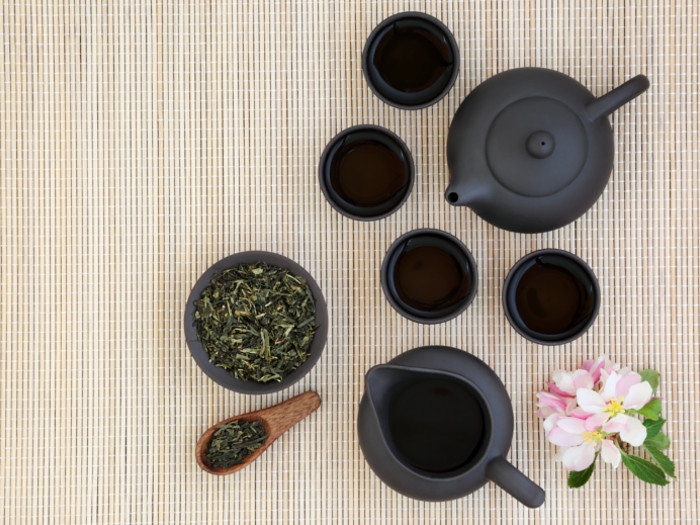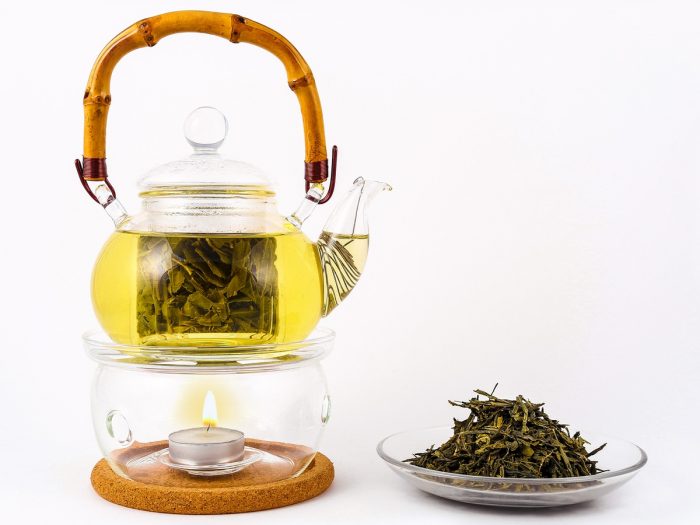Sencha tea is known for its potential health benefits. These may include its ability to fight chronic diseases, aid in weight loss, protect the immune system, increase energy, and stimulate cognitive activity. This popular form of green tea makes up approximately 80 percent of the tea produced in Japan, a major tea-drinking nation.
What is Sencha Tea?
Sencha tea is a Japanese ryokucha (green tea), which is brewed with whole leaves of the Camellia sinensis plant, giving the tea several impressive health benefits and a delicious, soothing flavor. The tea is yellow and is produced from the top buds and leaves of tea plants. It has a light aroma and bitter-sweet taste. Green tea refers to a type of tea that is not treated or processed in any way. Therefore, sencha, being a green tea, better retains its nutrients and active ingredients. [1]
Types of Sencha Tea
There are many types of sencha teas, the most popular ones are listed below.
- Shincha: Also known as “new tea”, this sencha tea has a sweeter taste and is harvested in the spring season.
- Asamushi sencha: This tea is a lightly steamed form of sencha green tea with a mild flavor.
- Fukamushi sencha: Fukamushi is a strong tea made by steeping the leaves for a longer duration. It has a dark color and rich flavor.
- Chumushi sencha: This sencha tea is a blend of the asamushi and fukamushi sencha teas. It is a moderately steamed tea with a yellowish-green color and a mild buttery flavor.
Sencha Tea vs Matcha Tea
Sencha and matcha teas are two of the most admired and consumed teas in Japan. Sencha tea is prepared by brewing the tea leaves in hot water, whereas matcha tea is made by whisking the powdered green tea leaves in hot water until frothy.
Sencha Tea Nutrition Facts
The health benefits derived from all teas, including sencha tea, may be in large part due to antioxidants, catechins, vitamin C, beta-carotene, folic acid, saponins, potassium, calcium, and phosphorus found in these nutrient-dense leaves. It also contains caffeine, which is a major contributor to many of the health benefits. [2]
Sencha Tea Benefits
Sencha tea confers the following benefits:
May Boost Metabolism
Caffeinated beverages, of which tea is one, are thought to be very good for stimulating the metabolism, which may improve passive fat-burning in the body. Sencha tea may not have as much caffeine as a cup of coffee, but it does have more caffeine than the majority of tea varieties out there. It can be also an important beverage to incorporate in many weight-loss diets. [3] [4]

Sencha tea with dried leaves Photo Credit: Shutterstock
May Boost Energy
The rich blend of vitamins, minerals, caffeine, and antioxidants found in this green tea variety may make it very effective as an energy-booster. If you want to increase productivity with a clear mind and a lower risk of a caffeine crash, sencha tea might be an excellent choice. [5]
May Lower Blood Pressure
Studies have shown that, despite having a significant amount of caffeine, green tea may help lower blood pressure and prevent excess strain on the heart. This can be beneficial for those at high risk of hypertension and other cardiovascular diseases. [6]
May Stimulate Cognition
Sencha tea has long been considered a brain stimulant, and the antioxidants found in this tea may stimulate neural pathways and prevent oxidative stress in the brain, which results in the deposition of plaque. This tea may help keep your mind sharp and focused, even as you age, and lowers your risk of developing cognitive disorders. [7]
May Reduce Cholesterol Levels
In addition to lowering the blood pressure, sencha tea is thought to reduce LDL or bad cholesterol levels, as shown in some animal models. It is thought that the catechins in this tea may affect lipid metabolism by decreasing the absorption of fat, and thus, of triglycerides and cholesterol. This, in turn, may boost metabolism, aid in weight loss, and protect from several cardiovascular complications. [8]
May Boost Immune System
High levels of vitamin C and a host of antioxidants make this tea a perfect immune system supporter. Tea is thought to stimulate the production of white blood cells, which may fight off infections, while also speeding healing if you are suffering from a common cold or flu. [9]
May Help In Skin Care
The antioxidants and vitamin C in sencha tea may prove to be essential to keep the skin looking radiant, acne-free, and youthful. They also may aid in reducing the appearance of wrinkles and delaying aging by hydrating the skin. [10]
May Improve Oral Health
The fluorine content in sencha may help strengthen teeth and prevent cavities. Sencha tea may also assist in keeping bad breath away and protecting your mouth from various germs.
May Be Used For Aromatherapy
Sencha tea extracts have a key role in aromatherapy as they are believed to relieve stress and lighten up the mood. May be that is why they are often used in incense, lotions, and soaps as well.
How to Make Sencha Tea?
You can easily make sencha tea at home, although you will need to source the tea leaves first! This tea is rarely found outside of Japan, but it is possible to find the tea leaves in certain specialty import stores.

Japanese Sencha Tea Recipe
Ingredients
- 2 tsp sencha leaves
- 2 cups of water
Instructions
- To make sencha tea, add the leaves to a teacup. You can pack the leaves into a strainer, but in Japan, allowing the leaves to steep freely is preferred, providing a richer flavor to the tea.
- Heat the water, but do not allow it to boil. If the water is too hot, it will cause the resulting tea to be bitter. Likewise, if the water is lukewarm, it produces a hearty and more wholesome flavor.
- Pour the water over the tea leaves in the cup and allow them to steep for 1-2 minutes.
- Allow the tea to cool for 1-2 minutes before serving. Pour small quantities of tea into each cup as that will help you get the best blend of strength and flavor. Ensure that the tea is consumed until the very last drop from the teapot. If even a single drop is left behind it will cause the additional brews using the same tea leaves to taste bad.

Sencha Tea Side Effects
There are some possible side effects to drinking sencha tea which include: [11]
- Heart palpitations
- Nausea
- Dizziness
- Headache
- Anxiety
- Irritability
These side effects may primarily be the result of the caffeine found in this variety of green tea, and typically only occur if you drink an excessive amount. There is less caffeine in green tea than coffee, but it can still affect the body. [12]
Risks
- Allergies: While allergies to green tea are rare, they may occur, with side effects like shortness of breath, throat swelling, skin irritation, and an upset stomach.
- Iron Deficiency: The antioxidants and polyphenolic compounds found in sencha tea may interfere with the body’s absorption of certain nutrients, namely iron, which can lead to anemia and iron deficiency if you drink a lot of this tea. Limiting your intake to 1-2 cups per day should help avoid this issue. [13]
- Stomach Upset: Sencha tea is rich in tannins, and while these do have antioxidant properties, they may also irritate the stomach, resulting in diarrhea, nausea, cramping, and bloating. This can be best avoided by drinking sencha tea along with food and limiting your intake to no more than 2 cups per day.
- Pregnancy: Drinking caffeinated beverages during pregnancy is not recommended. Consult your doctor as to the amount and types of tea it is safe to drink.
